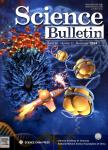Effect of matrix metalloproteinase-26(MMP-26) during embryo implantation in the mouse
Effect of matrix metalloproteinase-26 (MMP-26) during embryo implantation in the mouse作者机构:State Key Lab of Reproductive BiologyInstitute of ZoologyChinese Academy of SciencesBeijing 100080China Department of Chemistry and Biochemistry and Institute of Molecular BiophysicsFlorida State UniversityTallahasseeFlorida 32306USA
出 版 物:《Chinese Science Bulletin》 (Chin. Sci. Bull.)
年 卷 期:2002年第47卷第22期
页 面:1884-1888,1938页
核心收录:
学科分类:0710[理学-生物学] 07[理学] 0905[农学-畜牧学] 09[农学] 071007[理学-遗传学] 090501[农学-动物遗传育种与繁殖]
基 金:This work was supported in part by the Special Fund for the State Key Basic Research Projects (Grant No. G1999055903) the National Natural Science Foundation of China (Grant No. 30170357) the 100-Scientist-Program of the Chinese Academy of Sciences
主 题:matrix metalloproteinases (MMPs) MMP-26 embryo implantation mouse.
摘 要:Matrix metalloproteinase-26 (MMP-26, endo-metase and matrilysin-2), a novel member of the MMPs family, is detected not only in the placenta and uterus, but is widely expressed in malignant tumors from different sources as well as in diverse tumor cell lines. However, the function of MMP-26 in the reproductive system has never been reported. Expression of MMP-26 in mouse embryos and the function of the MMP-26 antibody during mouse embryo implantation was examined for the first time by injecting the uterine horn, immunohistochemistry, in situ hybridization, co-culture of mouse blastocysts and uterine monolayer epithelial cells, Western blot, RT-PCR, Northern blot and zymography. Our results show that there is strong expression of MMP-26 niRNA and protein in the mouse embryo. Furthermore, the MMP-26 antibody dramatically inhibited mouse embryo implantation and significantly inhibited adhesion and outgrowth of mouse blastocysts on in vitro uterine monolayer epithelial cells. At the same time, the MMP-26



